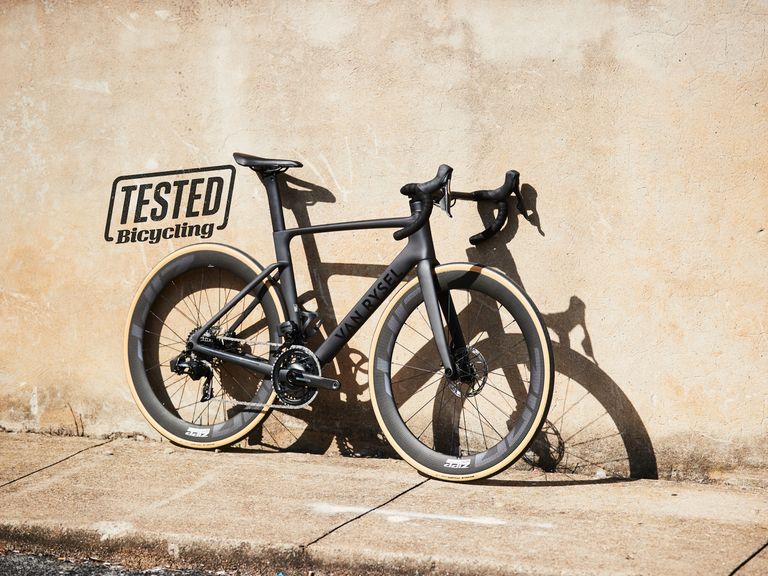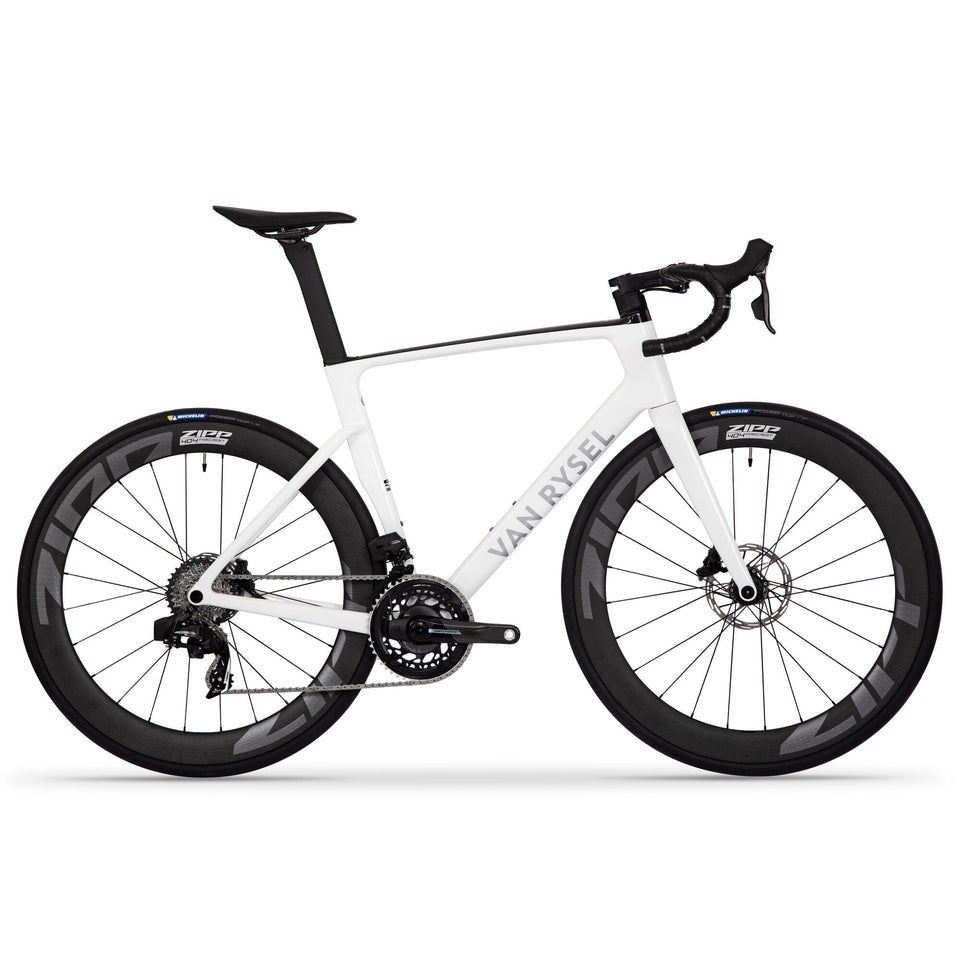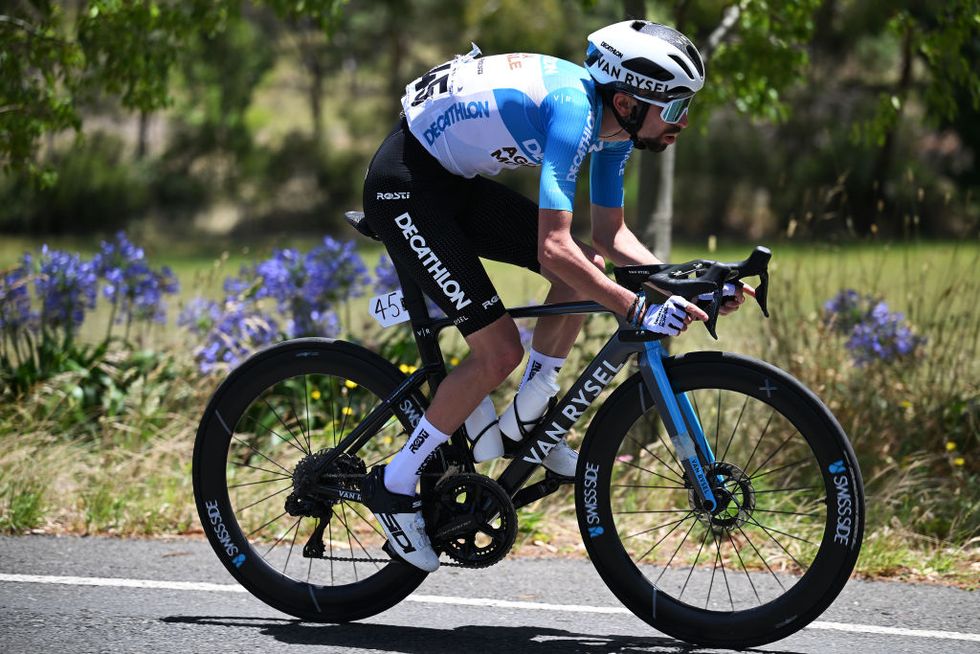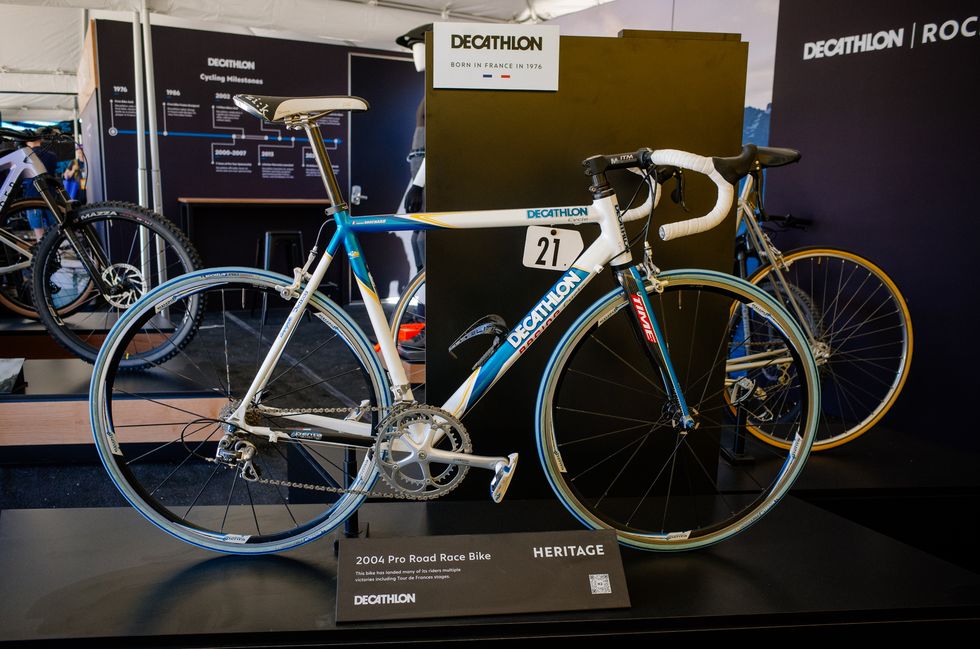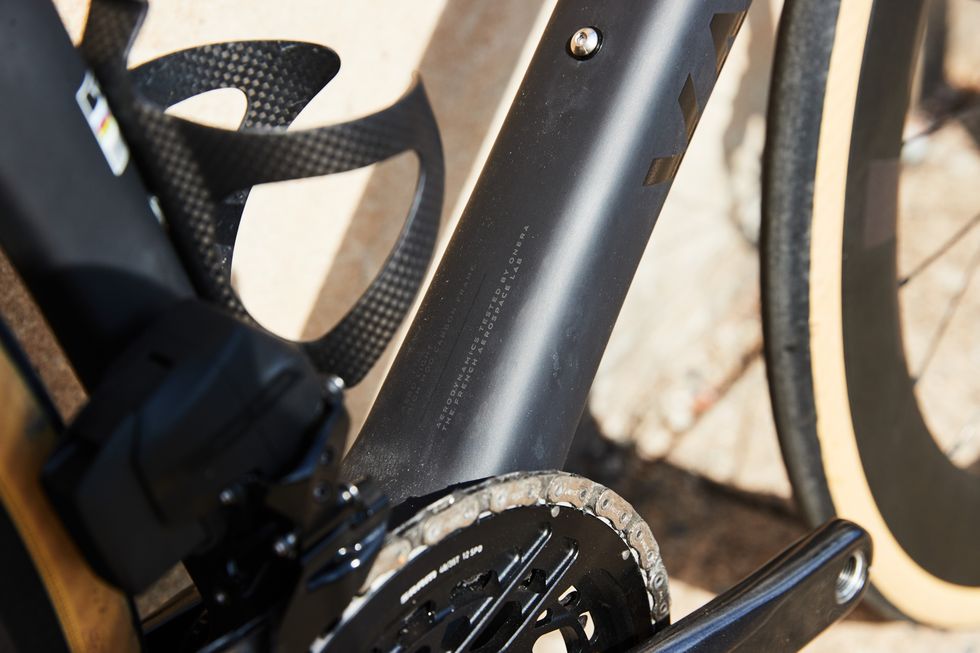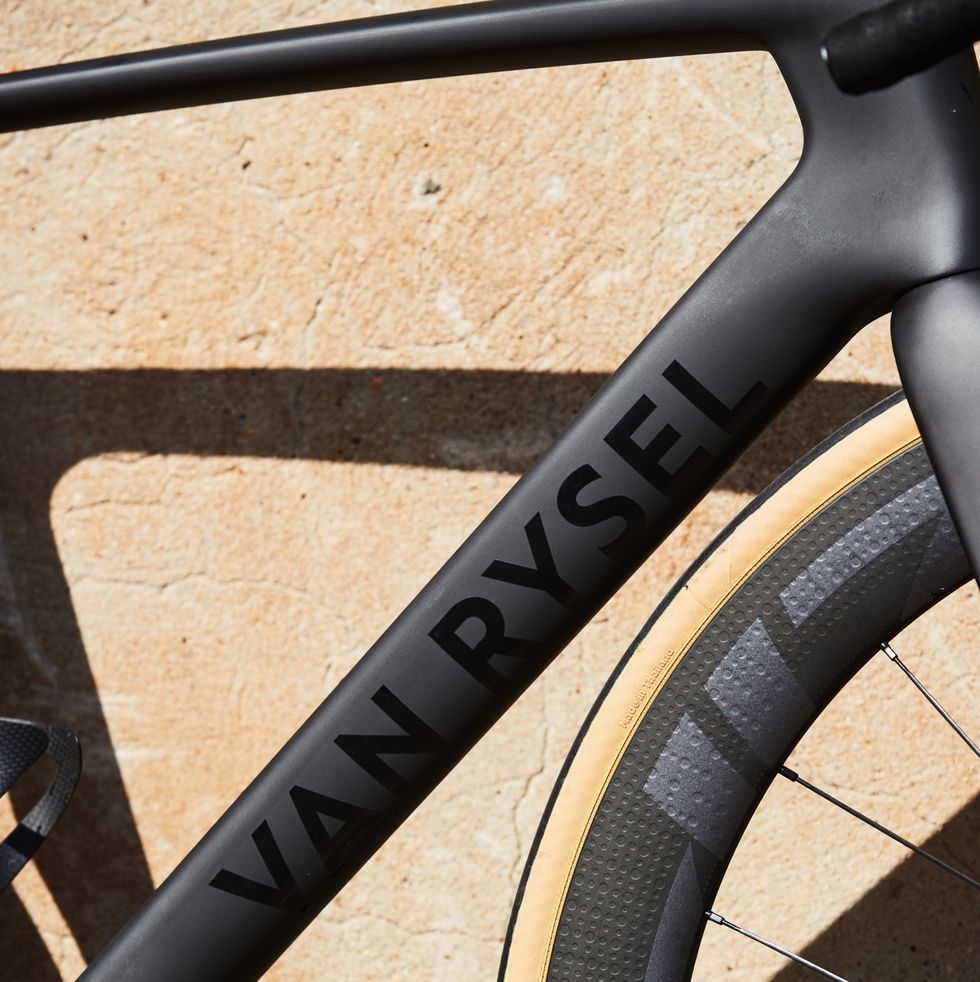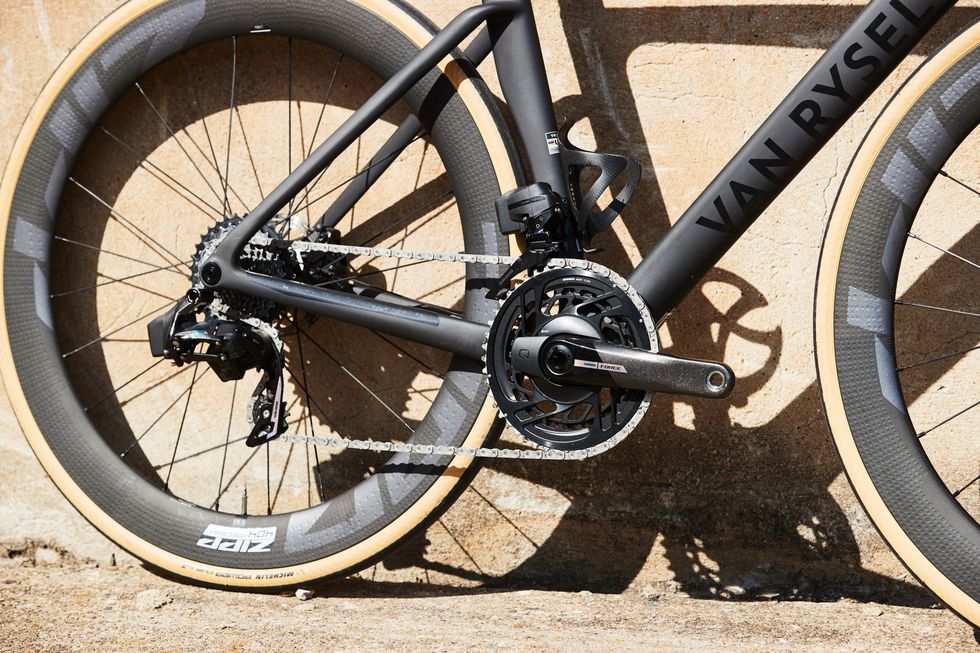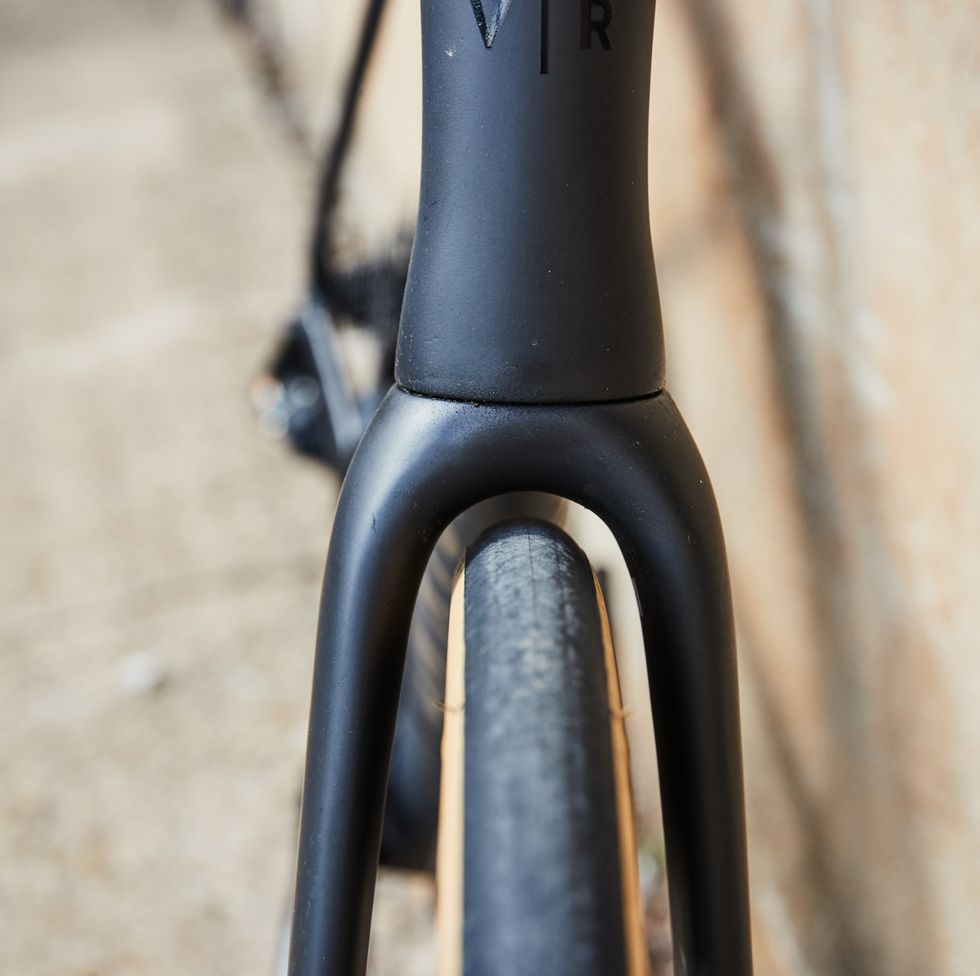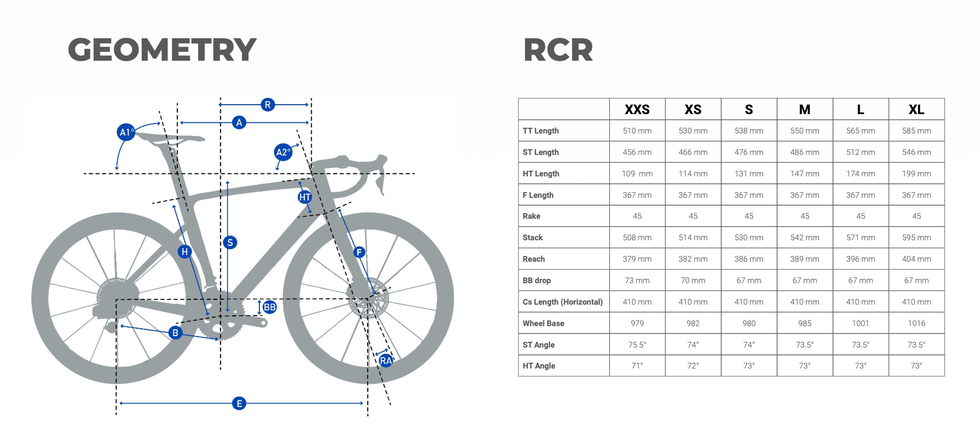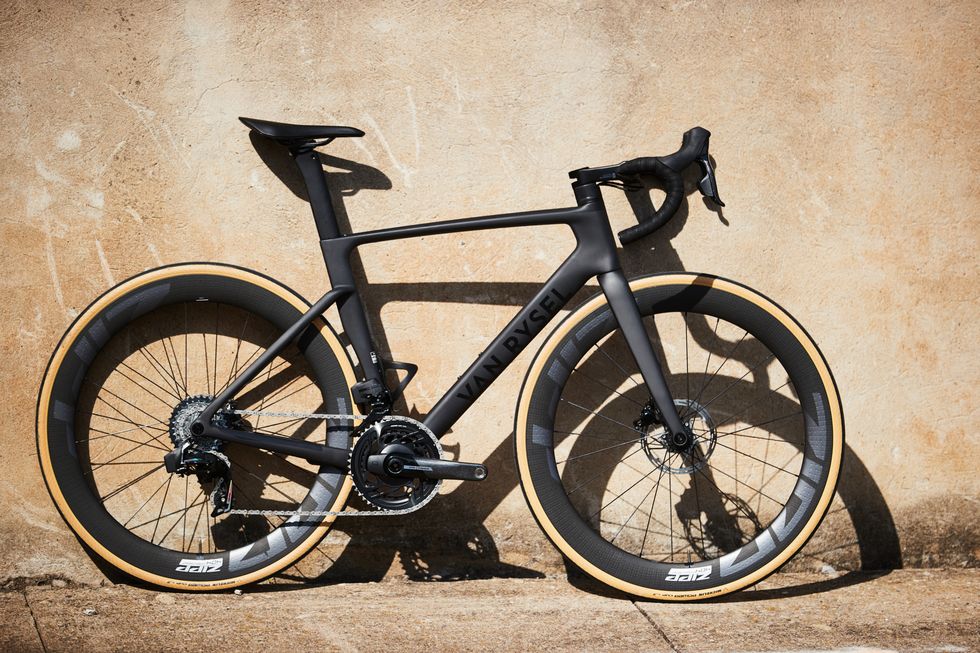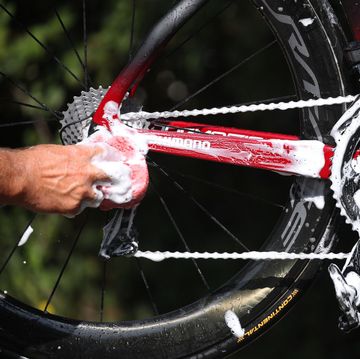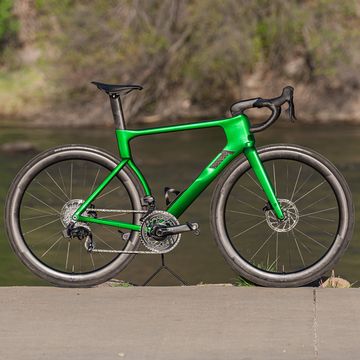Takeaway: The Van Rysel RCR has the features and frame shapes that riders and athletes expect from World Tour-worthy race bikes. The bike features SRAM’s excellent Force AXS groupset and has a fast ride feel, sharp handling, and loads of stiffness. With a price tag of $7,000, can the Decathlon house brand’s flagship model compete with more established and better-known elite-level road race bikes?
- Zipp 404 Firecrest wheels as stock equipment
- A familiar and dialed road racing geometry
- Clearance for 33mm tires
When Van Rysel announced a road race bike with SRAM Force AXS, Zipp 404 wheels, and a wind tunnel-optimized frame intended for World Tour use at Sea Otter 2023, I was immediately interested. Van Rysel’s $1,700 EDR AF 105 road model impressed me with its performance and value when I tested it a couple of years ago, so I was eager to dig into the brand’s new flagship model.
Van Rysel is Decathlon’s cycling-specific house brand. Bikes like the EDR AF embody the Decathlon ethos of high-quality products at very reasonable prices. Bicycling tested several products from Decathlon over the years, including a very well-received GRVL900 titanium gravel bike from Riverside (another Decathlon house brand) and even a low-cost Van Rysel indoor trainer.
For those unfamiliar with Decathlon, it is a France-based sporting goods retailer with upwards of 1,600 locations in over 60 countries. For Americans, an easy comparison might be to call it a French REI…if REI designed and manufactured a high-end race bike and then sponsored a World Tour team. And this is exactly what Decathlon did with the Van Rysel RCR
For 2024, the company assumed the title sponsorship of the French AG2R La Mondiale World Tour squad, rebranding as Decathlon-AG2R La Mondiale. But this is not Decathlon’s first foray into the top tier of professional cycling. In 2004, Decathlon supplied bikes to a French team named AG2R Prévoyance. So, it was no surprise to see them return to the same organization two decades later.
Pricing and Model Range
If you’re the type to judge a bike based solely on the stats, the RCR certainly has some appealing ones. Claimed weight for a medium RCR with SRAM Force is 16.3 pounds, with U.S pricing set at $6,999.
The first batch of RCR bikes is now available in the United States. This initial offering features only the SRAM Force AXS-equipped model with Zipp 404 Firecrest wheels, priced at $6,999. Decathlon also confirmed two additional RCR builds in the U.S. in 2024.
RCR Rival AXS - $5,499
This build uses Zipp 303s wheels and features the same frame (claimed weight: 830 grams, medium size) as the Force model. The planned availability is at the end of March.
RCR Team Edition - $10,999
Features the Pro version of the frame, which weighs 790g but is otherwise identical to the frame we tested. This model uses the same build kit as the Decathlon-AG2R La Mondiale team with a Shimano Dura-Ace Di2 drivetrain and SwissSide carbon wheels. Planned availability is in April.
Decathlon also plans to offer an RCR frameset, but riders must wait until 2025 for this option.
Aerodynamic Credentials
Decathlon pitches the RCR as a lightweight all-around race bike. It’s a bike that hopes to compete in the same realm as a Specialized Tarmac or Cannondale’s SuperSix Evo. The RCR frame uses truncated or flat-backed aero tube shapes to aid aerodynamics. Decathalon additionally heavily touts its work co-developing and validating the RCR aero shape with ONERA (Office National d'Études et de Recherches Aérospatiales), a French aeronautics, space, and defense research lab whose wind tunnel is near the Decathalon HQ.
Unfortunately, Decathlon has not made any of the RCR’s aero figures or claims public or available to the media despite leaning heavily into aerodynamics with the bike’s marketing. There’s even an ONERA decal on the frame itself.
A lack of information doesn’t mean the bike isn’t aero, and the frame implements most of the currently agreed-upon frame shapes that cut aero drag. The RCR uses dropped and flared seat stays, a narrow flat-back-shaped seat post and seat tube, a deep head tube and fork, and a compensation triangle at the bottom bracket: All design features proven to reduce aero drag.
In my personal aero testing, the RCR was only two seconds slower over my 12.25-mile test segment than Enve’s Melee (riding at 250 watts with the same clothing, kit, and pedal-based power meter). For context, a traditional round tube steel bike with external cables and box section wheels was a minute and fourteen seconds slower than the RCR.
In less objective terms, the RCR feels fast—like many modern bikes. The RCR doesn’t quite have the rapid feel of a pure aero bike (the Cervélo S5, for example), but it does not feel like you are being held back.
Ride Impressions
The RCR is a stiff bike. The bike has lots of road buzz, even with 28mm tires mounted on wide Zipp wheels aired to sensible tire pressures. But road buzz generally is not a dealbreaker on an explicitly race-oriented bike. The RCR’s ride quality is similar to a full-on aero road frame like the Canyon Aeroad—which a fellow tester described as “maybe too stiff.” That description is also how I feel about the RCR, especially compared to bikes like the Enve Melee, Canyon Ultimate, or even the very aerodynamic Cervelo S5.
My medium-sized test bike weighed in at 16.8 lbs without pedals. (If you’re keeping track, that is 0.5 lbs. heavier than claimed by Decathlon.) It’s not unusual for bicycles to be slightly off their brand’s claimed weights, but it’s worth noting. But 16.8 lbs for an aero-optimized bike with a 58mm deep wheelset and a second-tier groupset is pretty danged light.
The RCR’s uphill performance is strong, aided by the bike's incredible stiffness. Under full power while out of the saddle, the RCR matched my effort with lively eagerness and no perceptible flex in the frame. Being stiff and aero-optimized also made the RCR a hoot on flat and rolling roads. The RCR accelerates with the best, and the bike does a great job of maintaining its speed.
My only concern with the RCR ride quality is its firm feel. The front end is very rigid, and the stout aero seatpost has no perceptible give. The good news is that, like many of today's World Tour race bikes, the RCR accepts a tire as wide as 33mm. Swapping the stock 28mm tube-type tires for a 30mm tubeless setup would be my first upgrade to the RCR.
Geometry, Handling, and Sizing
Overall, handling is what I expect from a bike designed for World Tour racing. That is to say, it’s responsive and agile without being nervous. Sizes S through XL all have a trail figure of 58mm (identical to many other bikes in the category, such as the Specialized Tarmac and Cannondale’s Super Six Evo). In this sense, the RCR is as advertised. It delivers the type of snappy handling I expect from a race bike of this caliber.
Decathlon offers the RCR in six sizes, from XXS to XL. These sizes range from a 51cm top tube to a 58.5cm. Six sizes is the bare minimum for a road bike priced at $7,000. Specialized offers the Tarmac in seven sizes, and Canyon has eight. Pinarello offers an incredible eleven stock frame sizes.
Value and Conclusions
The value proposition of bikes is often a squishy metric. A $7,000 bike with SRAM Force AXS and Zipp 404 Firecrest wheels is a good value for some riders. (The wheels alone retail for $2,000.) At the same time, a $7,000 bike is an incredibly extravagant expense for many riders. But setting aside the personal financial perspective for a second, is the RCR a good deal relative to the competition?
Cannondale sells the highly regarded SuperSix Evo (with the same SRAM Force AXS groupset) for the same price as the RCR. The Specialized Tarmac SL8 with Force will set you back $8,500. Canyon’s Ultimate sells for $6,700. A Fezzari Veyo with the same wheels and group as the RCR costs $5,600. And I could keep listing bikes and prices. There is a plethora of choices for consumers these days.
For my money, the RCR falls squarely into the price range of “Yeah, that’s about what I expect that to cost.” It’s cheaper than the equivalent build of a Tarmac, and there are far more expensive road bikes on the market today. But it’s also not as screaming of a deal as I have come to expect from Decathlon.
So, we’re back to discussing what someone might consider valuable. Is there value in a World Tour team racing the RCR, as opposed to a bike like the Fezzari without a pro team endorsement? Maybe. But I’m not sure Decathlon sharpened the price enough to tempt me to purchase it before the SuperSix Evo (Bicycling’s 2023 Best Race Bike) or the Canyon Ultimate.
The Van Rysel RCR isn’t a bad bike—it’s quite good. If the price-driven value proposition traditionally offered by Decathlon with its products is removed from the decision, the RCR is priced competitively in the road race category. Unfortunately for the RCR, price is usually the biggest hook when buying a bike from Decathlon. And without that, it is hard to look past the many similarly priced options on the market.
Test Editor Dan Chabanov got his start in cycling as a New York City bike messenger but quickly found his way into road and cyclocross racing, competing in professional cyclocross races from 2009 to 2019 and winning a Master’s National Championship title in 2018. Prior to joining Bicycling in 2021, Dan worked as part of the race organization for the Red Hook Crit, as a coach with EnduranceWERX, as well as a freelance writer and photographer.
